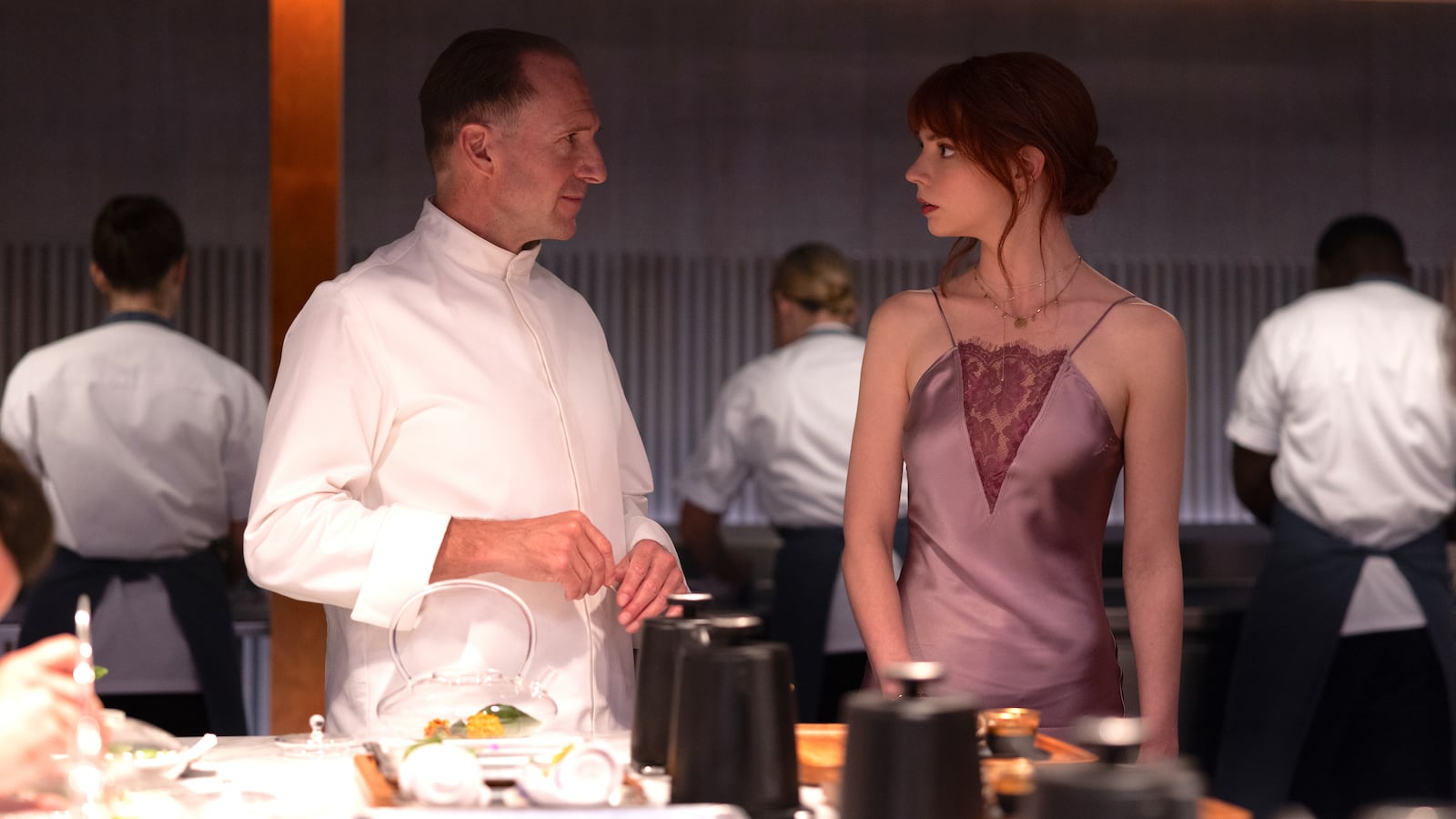Class grievances are the ingredients for the deliciously biting The Menu, a caustic horror-comedy (premiering at the Toronto International Film Festival ahead of its November 18 theatrical debut) about haute cuisine pretentiousness, service industry resentments, and the unbridled hatred that a bad movie can inspire.
Director Mark Mylod’s own film, thankfully, generates nothing but excitement, anxiety, and laughter via its story about a collection of disparate high-paying customers who travel to a remote island, where a distinguished chef pledges, for $1,250 a pop, to give them the culinary experience of a lifetime. He makes good on his promise, and so, too, does this sharp and witty satire, which is led by a fanatically intense Ralph Fiennes and an equally imposing Anya Taylor-Joy.
“Tonight will be madness,” exclaims Tyler (Nicholas Hoult), a smug foodie oozing enthusiasm for his opportunity to be wowed by Chef Slowik (Fiennes), a renowned artist who’s so successful that he now plies his trade for an elite clientele on Hawthorne island, an expansive farm-to-table get-away that provides all the materials for his gastronomic masterpieces. Tyler’s partner for the evening is Margot (Taylor-Joy), a date in a leather jacket, black boots and slinky dress whom Tyler chides for smoking because it will mess up her palette.
At the dock awaiting the boat that will take them to their destination, the rest of The Menu’s participants are introduced: a movie star (John Leguizamo) and his assistant (Aimee Carrero); a food critic (Janet McTeer) and her publisher (Paul Adelstein); a trio of financial-industry dude-bros (Arturo Castro, Rob Yang, Mark St. Cyr); and a wealthy older gentleman (Reed Birney) and his wife (Judith Light), the former of whom is instantly recognized by Margot.
This troupe is greeted on shore by Elsa (Hong Chau), the Chef’s right-hand woman, whose initial spiel about the island’s operation is stern to the point of creepiness. Having endured this blather, Margot dubs the place “the base camp of mount bullshit.”
There’s a distinct cult-like vibe to this cooking community, and that impression grows stronger once the guests make their way to the main building, a modernist open-kitchen facility where the white jacket-clad staff know their customers’ names and work like robots, except when snapped to attention by one of Chef’s thunderous claps.
Upon being seated, Chef imparts his chief instruction—“Do not eat. Taste. Savor. Relish”—and then begins serving them hand-prepared, exquisitely constructed courses, each one prefaced by a speech about the current dish’s theme as well as a brief contextual tale.
It's at this point that The Menu begins its descent into something dark and mysterious. (Revealing any more would spoil the delightful surprises it has in store.) Chef sees food as a means of storytelling, and the tale he intends to recount to these guests has everything to do with their wealth, privilege, status, arrogance, and entitlement, not to mention his (and his devoted employees’) own relationship to that power.
Moreover, he’s designed this event as a game that compels its participants to figure out the overarching meaning of the meal. Mylod’s film operates likewise, revealing the fundamentally ugly nature of its characters in clean, steady strokes and then teasing the bigger picture through harrowing incidents that put them in grave danger. That includes Margot, whose rapport becomes increasingly tense with not only Tyler but also Chef—who didn’t anticipate her arrival with the rest of this crew.
What’s apparent from the start is the awfulness of those involved in The Menu, from McTeer’s haughty critic and her sycophantic benefactor, to Leguizamo’s shallow and desperately needy big-screen comedian, to the three corporate douchebags who commence their feast by toasting work and money.
Operating from Seth Reiss and Will Tracy’s cutting script, the excellent cast efficiently establishes these upper-crusters’ smug awfulness, while title cards for each of Chef’s successive treats—as well as the immaculate, minimalist dishes themselves—set a playfully critical tone. This is a world populated, on both sides of the proverbial counter, by the wantonly pretentious, highlighted by Fiennes’ Chef, a quasi-fascistic genius who makes Gordon Ramsey (and everyone on FX’s The Bear) appear downright relaxed by comparison.
Fiennes has long since mastered this particular brand of refined malevolence, and yet his Chef nonetheless remains an unpredictable mastermind throughout The Menu, even once the shit begins hitting the fan and his chief intentions become clear. The actor’s performance is in perfect harmony with Mylod’s direction: Both are defined by a rigid, meticulous, luxurious style that masks a wellspring of bitterness, disgust and rage.
Taylor-Joy, on the other hand, functions as the counterpoint to that scary energy. Her Margot is a wild card whose willingness to go along with this exhibition has its limits—and who, once pushed past that breaking point, ignites a conflict that threatens to upend the Chef’s plans. Chillier than the “snow” used to decorate Chef’s first course, Taylor-Joy exudes a snarky, self-possessed ferociousness that ultimately turns her into the material’s nominal protagonist.
“You’ll eat less than you desire and more than you deserve,” whispers Elsa to a patron at the outset of this insane gathering, and though the implications of that statement are difficult to initially discern—and at potential odds with Chef’s guarantee that every meal has been crafted to satisfy its consumer—there’s no doubt that wicked machinations are afoot.
The Menu eventually reveals itself to be an ever-escalating catastrophe that’s supposed to end with a bang, but the real pleasure of Mylod’s thriller is its pointed stabs at not only the rich and famous—and the way in which they thoughtlessly and avariciously prey upon others—but also gourmand culture: from the connoisseurs who can identify a split emulsion to the chefs who demand tyrannical obedience from their sous-chefs and assorted underlings.
No one remains unscathed in this amusing hybrid of folk horror, Kitchen Nightmares, Eating Raoul, and The Exterminating Angel. The Menu casts a critical eye on its world of grossly gluttonous haves and psychotically angry have-nots, imagining them as opposing sides in a conflict destined to end in apocalyptic Last Supper mayhem. Bon appétit!






